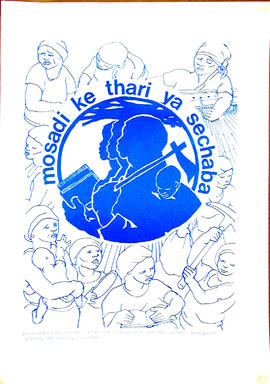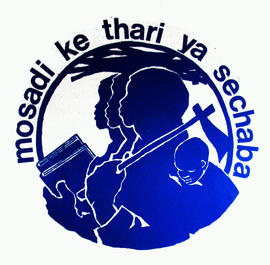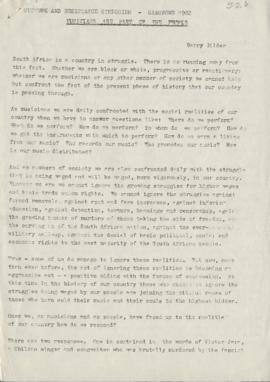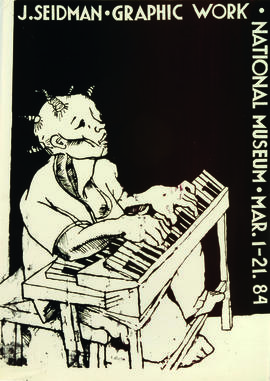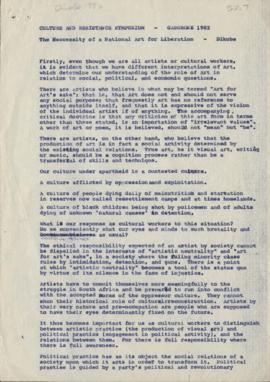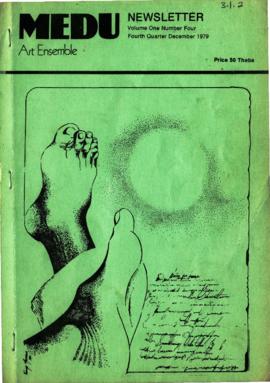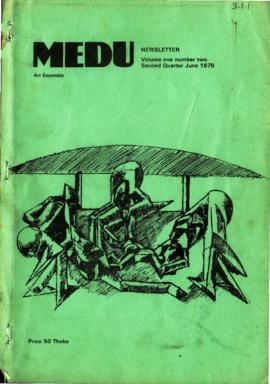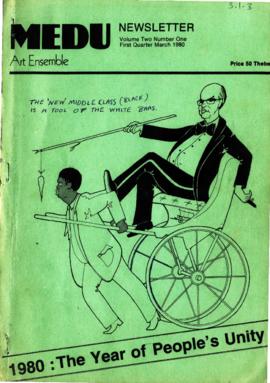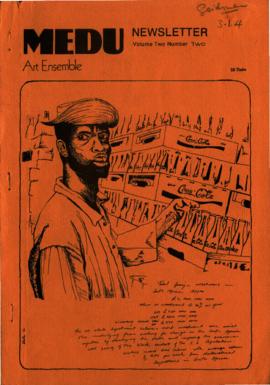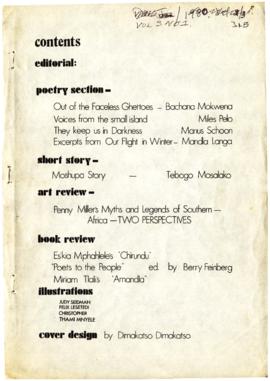Showing 189 results
Archival descriptionMusicians are part of the people
- ZA MEDU MEDU-5-5.2-5.2.6
- Subseries
- 1982
In this paper, Barry Gilder argues that it is impossible for musicians to be separate from the struggle against Apartheid in South Africa. He suggests that musicians have two options; to be part of the struggle against Apartheid as "revolutionaries who make music" or as musicians who participate in the "revolution as musicians". Musicians can fight Apartheid through holding benefit concerts, creating their own record labels, organising into a collective musical organisation and boycotting the Apartheid state. These methods of resistance and artistic expression, the author argues, will all contribute to a necessary and genuinely popular and progressive musical culture.
Medu Art Ensemble
Neccessity of a National Art for Liberation
- ZA MEDU MEDU-5-5.2-5.2.7
- Subseries
- 1982
Art should be a cognitive process, rather than transfer of skills and technique. In the context of an artistic culture which is afflicted by oppression and exploitation, art must be a process which people can relate to, identify with and be a part of. The article argues that art must teach people, "in the most vivid and imaginative ways ... how to take control of their own experience and observations" and how to link these to a just and free society.
Medu Art Ensemble
Newsletter 1979, December, Vol. 1, No. 4
- ZA MEDU MEDU-3-3.1-3.1.2
- Subseries
- December 1979
Part of 3-MEDU NEWSLETTERS
Newsletter has interview section of Mosa Jonas Gwangwa who is a composer, musician and member of Medu Art Ensemble. He is interviewed by Medu project co-ordinator Mongane Serote. Jonas Gwangwa shares his background from his early childhood when his parents arrived at Orlando in 1931. Furthermore, he talks about his musical background that is influenced by his musical family.
Medu Art Ensemble
Newsletter 1979, Vol. 1, No. 2
- ZA MEDU MEDU-3-3.1-3.1.1
- Subseries
- 1979
Part of 3-MEDU NEWSLETTERS
In this newsletter, there are five poetry sections, namely Dead roots, Apology from London by Arthur Nortje, Miles of many fears by Bachana wa Mokwena, A prayer for Africa from the mouths of babies by Mandlenkosi Langa and I surrender by Thele Moema. Other section is the art review of the film by Mongane Serote called 'The wild Geese'. Medu's views on burning current issues in South Africa are included, interview by Bachan wa Mokwena interviewing Teresa Devant de Gonzalez regarding the theatre and the role of an artist in an oppressive system. Lastly, there are featured articles by Molefe Pheto, Phetu Serote and Timothy Williams.
Medu Art Ensemble
Newsletter 1980, March, Vol. 2, No. 1
- ZA MEDU MEDU-3-3.1-3.1.3
- Subseries
- 1980
Part of 3-MEDU NEWSLETTERS
Newsletter was issued in 1980 during the first quarter in March. Poetry section of this issue includes Tribute to Martyrs by James Matthews, Alex death blues by Dumisani Dhlamini, untitled poetry by Chippa wa Moagi. A short story by Mongane Serote titled the mosquito. An interview of Thamsanqa Mnyele interviewed by Tim Williams. Thami talks about his journey as a South African painter and designer. Thami Mnyele was a member of Medu. Lastly, the cover design of this newsletter was designed by F. Mbali and illustration by Thami Mnyele.
Medu Art Ensemble
Newsletter 1980, Vol. 2, No. 2
- ZA MEDU MEDU-3-3.1-3.1.4
- Subseries
- 1980
Part of 3-MEDU NEWSLETTERS
Cultural Bodies are a means for artists to learn from and communicate with their communities. How is it done? This edition of Medu opens discussion on the inter-communication between artists and communities. To this end, a "Graffiti Page" has been added to allow for public comments on Thami Mnyele's exhibition, which was held at the Gaborone Museum. Critical artistic reflection is included in this issue through reviews of the art of Thami Mnyele, Maselwa Malatji, Bachana Mokwena and Dennis Brutus. Like all Medu Newsletters, this includes exciting poetry by Mongane Serote and Keorapetse Kgositsile. Front page graphic by Heinz Klug on lithograph.
Medu Art Ensemble
Newsletter 1981, Vol. 3, No. 1
- ZA MEDU MEDU-3-3.1-3.1.5
- Subseries
- 1981
Part of 3-MEDU NEWSLETTERS
The central thrust behind this newsletter by the Medu Art Ensemble is the need to do art collectively and with a consciousness about community. The poetry section includes "Out of the faceless ghettos" by Bachana Mokwena. In this poem, his constant refrain to "Momma" reflects on the personal and structural pain of Apartheid through alternating between the words "momma", "mother" and "motherland". Here he laments the long history of racial oppression, the scars on Momma's back and the near-freedom which he grasps. A short story by Tebogo Mosabako entitled "Moshupa Story" relays a story of a young man in Moshupa Botswana, who through an act of goodwill receives care and reciprocity. In the section "Art Review", Dimakatso Dimakatso reviews Penny Miller's "Myths and Legends of Southern Africa", which, it is argued, reinforces the racist myths and legends of southern Africa. Es'kia Mpahlele's "Chirundu", a novel about the "entire process of life" in an (un-named) newly independent African state, is reviewed by Njabulo Ndebele. Each of these artforms presented in this edition speak to community, change, resistance and creativity.
Medu Art Ensemble



